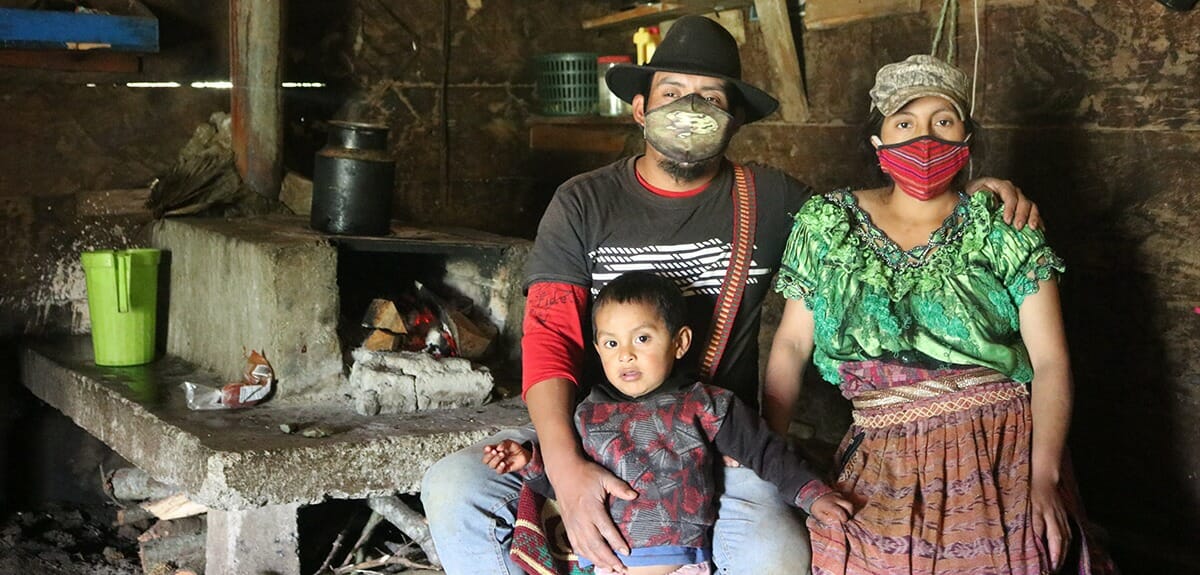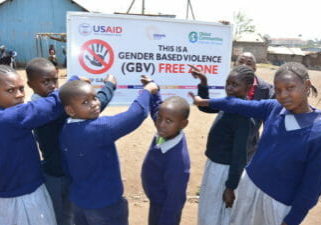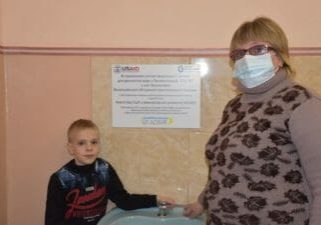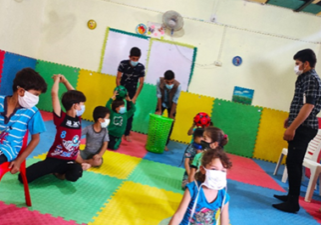News > Blog
Equipping Families to Build Climate Smart Communities in Guatemala
Published 04/22/2021 by globalcommunities

In the dry western highlands of Huehuetenango, Guatemala, families prepare food over traditional open fires, consuming far more wood than would be necessary with a modern stove. Cooking this way not only results in greater deforestation, it also results in greater carbon emissions and causes families smoke-related health problems.
PCI, a Global Communities Partner, is committed to not only building the resilience of these communities as they adapt to climate change but also to including them in solutions that drive climate change mitigation.
Since February 2020, support from the Rick Steves’ Europe Climate Smart Commitment has allowed PCI to supply carbon emission reducing, fuel-efficient cookstoves in Guatemala, begin reforestation efforts, improve the region’s food security, and give women the tools to ensure the project’s long-term success.
To date, more than 300 high-priority households (approximately 1,600 people) in the Pajuil Pais community of Aguacatan, Huehuetenango, have benefited from the Climate Smart Communities program, which is giving families the tools to directly address both the causes and impacts of climate change.

Reducing Carbon Emissions with Clean Cookstoves
A typical cooking fire, like the ones used by nearly 3 billion people in the developing world, produces a staggering 400 cigarettes worth of smoke per hour. Pollutants released by cooking fires cause illnesses like lung cancer, pneumonia, and heart disease that kill almost 4 million people per year. That burden is disproportionately borne by women and young children. Pneumonia is also the leading cause of death in children under five, and almost half of those deaths are caused by household air pollution from inefficient cooking practices. That pollution is not just confined indoors. These inefficient cookstoves and cooking fires are estimated to contribute about 25 percent of the world’s emissions of black carbon and account for 2.3 percent of global carbon emissions that contribute to rapidly advancing climate change.
In 2020, support from Rick Steves’ Europe allowed PCI to equip more than 250 families in Pajuil Pais with clean, fuel-efficient cookstoves. These stoves lower carbon emissions from traditional cookstoves by at least 50%. Over the average 8-year life of the stoves, they will reduce more than 9,800 tons of carbon emissions, which equates to approximately 3,570 roundtrip flight between the U.S. and Europe.
Cooking over an open fire, project participant Rosa Perez said she would have to cover her face while she prepared food and still ended up with an irritated nose and eyes from the smoke she inhaled. Using her new cookstove has eliminated these issues.
“I feel a big change,” she said. “I cook my food with joy, my kitchen is cleaner, and I think I won’t get sick from the smoke.”
She added that her firewood lasts longer now, and she has learned to use other resources like corn cobs as fuel to reduce the burden of collecting wood.


Planting Seeds for the Future: Conservation and Reforestation
About 71 percent of households in Guatemala use wood for cooking, and Guatemalans consume about 16 million tons of firewood each year. That rate of consumption outstrips the country’s wood production by 45 percent, and over the last several decades, Guatemala has lost significant woodlands. Trees mitigate climate change by capturing greenhouse gases, but that stored carbon is released into the atmosphere when they are cut down. That means as people fell trees to fuel their cooking fires, they contribute directly to deforestation and climate change.
PCI’s project needs assessment found that families in Pajuil Pais use an average of 28 trees per year to meet their fuel needs. Stoves supplied through the Climate Smart Communities program will cut this figure in half, conserve about 3,500 trees per year, and save about 64 acres of forest over the average life of the stoves.
To promote reforestation and provide a renewable source of cooking fuel in the community, funding from Rick Steves’ Europe also supported the planting of 14,000 trees, covering a combined area of roughly 25 acres. With 10,000 trees procured with project funds, the local government was inspired to donate an additional 4,000 trees and committed to follow up with local families and provide technical assistance for additional reforestation activities.
The project has also strengthened communication between the local government, community leaders, and volunteers to facilitate the monitoring and management of the reforested trees. In this way, the Climate Smart Communities program planted a seed that will continue to grow in the community long after the project ends.
“I am grateful for this opportunity to plant trees,” said Juana Pastor, a program participant. “We have a habit of removing trees and not planting new ones. Now, we will make sure to be more protective of our resources.”

Clean Water, Cleaner Climate
There is no central water system serving families in Pajuil Pais, so most households harvest rainwater and store it in clay or plastic containers. In its project needs assessment, PCI found that 100 percent of households were boiling water to purify it for drinking and cooking, which requires an intense use of firewood that contributes to deforestation, greenhouse gas emissions, and family health hazards related to smoke inhalation and burns.
With support from Rick Steves’ Europe, PCI introduced Ecofiltro water filters, a World Bank-recognized innovation that cleans two liters of non-potable water per hour through a gravity fed ceramic filter requiring no heat. This method of treating water not only reduces waterborne diarrheal diseases that are a major cause of chronic malnutrition and stunting, it also dramatically decreases firewood consumption, household pollution, and carbon emissions caused by boiling water. Notably, the global warming potential of Ecofiltro use is 65 percent less than boiling water and 99 percent less than bottled water.
Through the Climate Smart Communities program, PCI delivered a total of 306 water filters to families in Pajuil Pais. PCI has built capacity among community leaders and empowered them to oversee the Ecofiltro installation and trainings, which teach participants how to operate and maintain their new filters while also educating them about their health and environmental benefits.
Program participant Juana Perez Hernandez said the Ecofiltro keeps everyone in her family healthier. Since they no longer need to boil water and have a more efficient stove, they also spend less time and money collecting firewood. Now that they can safely eat in their kitchen, Juana said she and her husband plan to turn their old stove into a table where the family can gather.
Sanitation, Hygiene and Climate Change
Climate change is expected to exacerbate existing health problems, including those related to poor sanitation that already plagued the world’s most vulnerable communities. Extreme weather cycles of drought and intense rainfall cause flooding and run-off that result in higher levels of fecal contamination and pollutants in groundwater, increasing risks of disease and environmental contamination. Waterborne diseases are the main cause of malnutrition and stunting that jeopardizes the health and development of more than half the children in Pajuil Pais.
During the project needs assessment, PCI found that only 65 percent of households had a latrine and among those, over 40 percent were unhygienic. With the onset of COVID-19, the need for improved sanitation and dedicated household latrines became critical. A total of 168 households teamed with PCI to construct new and improved latrines that benefit both household and community sanitation and reduce environmental damage. PCI trains volunteers to educate the community and promote healthy sanitation and hygiene behaviors.

Hope for a Brighter Future
In addition to the Climate Smart Communities program, PCI implements USAID-funded food security programs in the Western Highlands of Guatemala, including emergency programs intended to help vulnerable households suffering from the combine effects of drought and COVID-19. With follow-on funding from Rick Steves’ Europe, PCI can now enroll these households into Climate Smart Communities, equipping more than 160 additional families with cookstoves, eliminating 6,850 tons of carbon emissions, replanting 7,000 trees, and saving roughly 11,200 cubic meters of wood.
At a time when it is needed most, families in the Pajuil Pais community have hope for a brighter future. PCI’s Climate Smart Communities program is demonstrably reducing carbon emissions and deforestation while improving community health and resiliency. Perhaps more importantly, it has empowered vulnerable families with the knowledge that they can be part of the solution to climate change.






